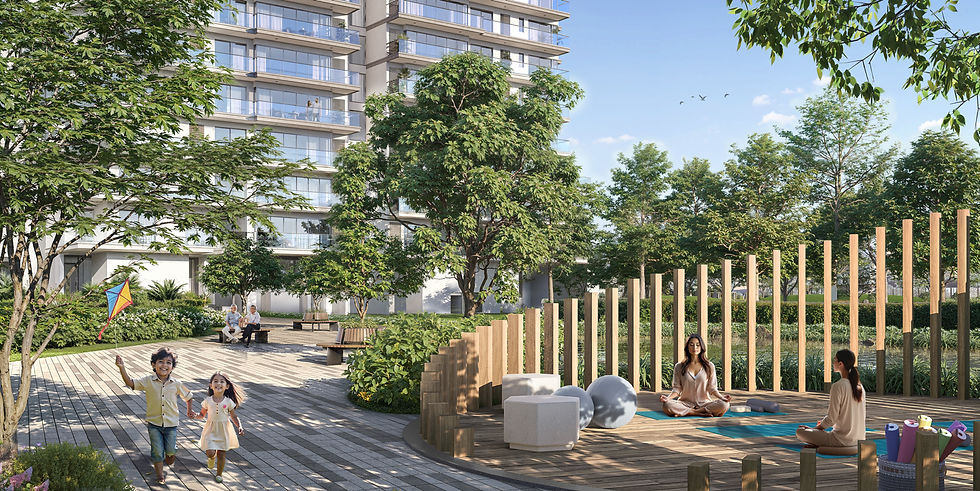How To Choose The Right Neighborhood For Your Next Property Investment
- Vedant Taneja
- Feb 13, 2025
- 4 min read
Updated: Apr 20, 2025
Neighborhood plays a vital role in your day-to-day life. Investing in a property is not just about finding your perfect home or office, It is also about choosing the right neighborhood. A great property in a bad location can quickly turn into a poor investment. Whether you buying a home, a property to rent, creating an office space, or for any other purpose, selecting the right area is crucial to maximizing your returns.
Here’s how you can make an informed decision when choosing a neighborhood for your next property investment.

UNDERSTAND YOUR INVESTMENT GOAL
Before looking for your ideal neighborhood, you should understand the main motive for your investment. If you are investing for rental purposes, you would want to choose a neighborhood where people are renting out properties more. Similarly, when you are investing in property to open an office space, you would like an area where you can communicate with more businesses and an area where your business can be seen by people.
RESEARCH MARKET TRENDS
It is very important to understand market trends before investing in anything. The same goes for choosing a neighborhood for your new property. Market trends help you understand where a neighborhood is going. You can look for -
Property value trends - Is the area of investment appreciating or depreciating?
Rental demand - If you are looking for a property that you want to rent in the future, a neighborhood with demand for rental property is to go.
Job market and economy - Areas with more jobs tend to attract more tenants and buyers, thus making the neighborhood an ideal one.
Future development plans - A market with great future development plans and a neighborhood where there are many upcoming projects and new businesses can boost the property value with time.
CRIME AND SAFETY STATISTICS
No one would want a neighborhood with an increasing crime rate. To find your perfect safest neighborhood, you should look for the crime rate in the neighborhood. You can use online crime mapping tools or police reports of the neighborhood for your report. Compare crime statistics between different neighborhoods and consider whether trends are improving or worsening.
SCHOOL DISTRICTS AND EDUCATION QUALITY
Everyone wants their children to get the best educational facilities. Researching schools from different neighborhoods and comparing them to find the best one for your liking is very important. Comparing the education quality, the facilities, and the trends of achievements for the school would help you figure out the best choice for your children and your favorable neighborhood.
PROXIMITY TO AMENITIES AND TRANSPORTATION
Convenience is a major selling point for renters and buyers alike. A neighborhood with easy access to public transportation, highways, shopping centers, restaurants, parks, and entertainment venues will always be more attractive. Compare these amenities and facilities with their quality and feasibility, and choose the one that fits you and your needs. Consider walkability scores and commuting times to major employment hubs.

DEMOGRAPHICS AND COMMUNITY VIBES
When looking for a new neighborhood, the first thing we all want is good neighbors and a great community to live in. Getting to know the demographics of the neighborhoods and community culture is a must. Young professionals, families, and retirees all have different housing preferences. Visit the neighborhood, talk to locals, and observe the atmosphere to ensure it aligns with your target market.
CHECK PROPERTY TAX AND INSURANCE COST
House taxes and insurance costs can eat into your profits. Knowing the local tax rates and the best insurance can help you balance your costs and maximize your profits without any loss in the quality of your investment. Some areas offer tax incentives or benefits for real estate investors, which can boost your returns.
LOCAL REGULARIZATION AND ZONING LAW
Before investing, you should understand the local laws regarding properties like zoning laws, landlord and tenant laws. Some cities have rent control policies, restrictions on short-term rentals, or specific renovation rules that could impact your investment strategy. On the other hand, some cities have limits on the number of floors you can build in a home. Choose the best option according to your needs.
LOOK FOR SIGNS OF GROWTH AND GENTRIFICATION
Many neighborhood has the growth potential and have shown constant growth in their past years. Look for the neighborhood that shows signs of great growth, such as new businesses, increasing property values, and infrastructure projects. However, be cautious of speculative markets where prices rise too quickly without strong economic support.

TALK TO LOCAL REAL ESTATE EXPERTS
Talking to the local real estate agents clears out a lot of your queries. They have all the knowledge regarding the recent market trends, the local property laws, tenants' laws, etc. Talking to a real estate agent can narrow down your options and make it easy for you to look for the neighborhood with your preferences, hence saving you time.
CONCLUSIONS
Choosing the right neighborhood is one of the most critical steps in making a successful property investment. By conducting thorough research and considering factors like market trends, safety, amenities, and future growth, you can make an informed decision that maximizes your returns. A good neighborhood doesn’t just attract buyers and tenants—it ensures your investment grows in value over time.
%20(1)-cdr.png)



Comments